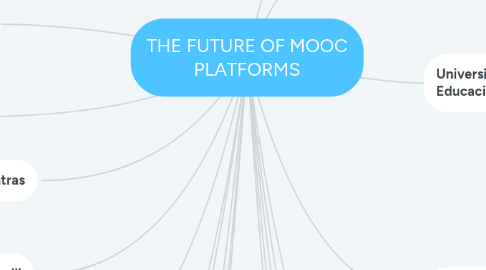
1. International Quality Group, Council for Higher Education Accreditation
1.1. Authors
1.1.1. John Daniel
1.2. Publications
1.2.1. The Future of MOOCs: Adaptive Learning or Business Model?
2. Aristotle University of Thessaloniki
2.1. Authors
2.1.1. Christos Katsanos
2.2. Publications
2.2.1. Comparative usability evaluation of three popular MOOC platforms
3. University of Patras
3.1. Authors
3.1.1. Michalis Xenos
3.2. Publications
3.2.1. Comparative usability evaluation of three popular MOOC platforms
4. Universitat Rovira i Virgili
4.1. Authors
4.1.1. Mercè Gisbert Cervera
4.2. Publications
4.2.1. The Future of MOOCs: Adaptive Learning or Business Model?
5. Delft University of Technology
5.1. Authors
5.1.1. Mohammad Khalil
5.2. Publications
5.2.1. How can Gamification Improve MOOC Student Engagement?
5.2.2. How Inverse Blended Learning can Turn Up Learning with MOOCs?
6. Salzburg Research
6.1. Authors
6.1.1. Sandra Schön
6.2. Publications
6.2.1. How Inverse Blended Learning can Turn Up Learning with MOOCs?
6.2.2. Inverse Blended Learning – a didactical concept for MOOCs and its positive effects on dropoutrates
7. Universidad Polite´cnica de Madrid
7.1. Authors
7.1.1. JOSE´ L. MARTI´N
7.2. Publications
7.2.1. MOOCs for all: Evaluating the accessibility of top MOOC platforms
8. Universidad de Alcala
8.1. Authors
8.1.1. JOSE´ R. HILERA
8.2. Publications
8.2.1. MOOCs for all: Evaluating the accessibility of top MOOC platforms
9. European Association of Distance Teaching Universities
9.1. Authors
9.1.1. Darco Jansen
9.2. Publications
9.2.1. The 2018 OpenupEd Trend Report on MOOCs
10. Carl von Ossietzky University of Oldenburg
10.1. Authors
10.1.1. Olaf Zawacki-Richter
10.2. Publications
10.2.1. Trends and Patterns in Massive Open Online Courses: Review and Content Analysis of Research on MOOCs (2008-2015)
11. University of the Basque Country
11.1. Authors
11.1.1. Inmaculada Maiz Olazabalaga
11.1.2. Carlos Castaño Garrido
11.1.3. Urtza Garay Ruiz
11.2. Publications
11.2.1. Research on MOOCs: Trends and Methodologies
12. Hellenic Open University
12.1. Authors
12.1.1. Alexandros Tsironis
12.2. Publications
12.2.1. Comparative usability evaluation of three popular MOOC platforms
13. Universidad Nacional de Educación a Distancia (UNED)
13.1. Authors
13.1.1. Esteban Vázquez Cano
13.2. Publications
13.2.1. The Future of MOOCs: Adaptive Learning or Business Model?
13.2.2. The 2018 OpenupEd Trend Report on MOOCs
14. Graz University of Technology, Educa-tional Technology
14.1. Authors
14.1.1. Mohammad KHALIL
14.1.2. Martin EBNER
14.2. Publications
14.2.1. Driving Student Motivation in MOOCs through a Conceptual Activity-Motivation Framework
14.2.2. How can Gamification Improve MOOC Student Engagement?
14.2.3. How Inverse Blended Learning can Turn Up Learning with MOOCs?
14.2.4. Inverse Blended Learning – a didactical concept for MOOCs and its positive effects on dropoutrates
14.2.5. Learning Analytics in MOOCs: Can Data Improve Students Retention and Learning?
15. Leiden University
15.1. Authors
15.1.1. Wilfried Admiraal
15.2. Publications
15.2.1. How can Gamification Improve MOOC Student Engagement?
16. CONEDU
16.1. Authors
16.1.1. Christian Gütl
16.2. Publications
16.2.1. How Inverse Blended Learning can Turn Up Learning with MOOCs?
17. Universidad Galileo
17.1. Authors
17.1.1. HE´CTOR R. AMADO-SALVATIERRA
17.2. Publications
17.2.1. MOOCs for all: Evaluating the accessibility of top MOOC platforms
18. Management and Science University
18.1. Authors
18.1.1. Ummy Gusti Salamah
18.1.2. Rabab Alayham Abbas Helmi
18.2. Publications
18.2.1. MOOC Platforms: a Review and Comparison
19. Anadolu University
19.1. Authors
19.1.1. Aras Bozkurt
19.1.2. Ela Akgün-Özbek
19.2. Publications
19.2.1. Trends and Patterns in Massive Open Online Courses: Review and Content Analysis of Research on MOOCs (2008-2015)
